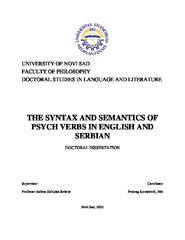Приказ основних података о дисертацији
The Syntax and Semantics of Psych Verbs in English and Serbian (Sintaksa i semantika psiholoških glagola u engleskom i srpskom jeziku)
| dc.contributor.advisor | Halupka-Rešetar, Sabina | |
| dc.contributor.other | Štrbac, Gordana | |
| dc.contributor.other | Stanković, Branimir | |
| dc.contributor.other | Milićev, Tatjana | |
| dc.contributor.other | Halupka-Rešetar, Sabina | |
| dc.creator | Kovačević, Predrag | |
| dc.date.accessioned | 2022-09-06T08:07:49Z | |
| dc.date.available | 2022-09-06T08:07:49Z | |
| dc.date.issued | 2022-06-13 | |
| dc.identifier.uri | https://www.cris.uns.ac.rs/DownloadFileServlet/Disertacija164543077830437.pdf?controlNumber=(BISIS)120293&fileName=164543077830437.pdf&id=19633&source=NaRDuS&language=sr | sr |
| dc.identifier.uri | https://www.cris.uns.ac.rs/record.jsf?recordId=120293&source=NaRDuS&language=sr | sr |
| dc.identifier.uri | https://www.cris.uns.ac.rs/DownloadFileServlet/IzvestajKomisije164543078587572.pdf?controlNumber=(BISIS)120293&fileName=164543078587572.pdf&id=19634&source=NaRDuS&language=sr | sr |
| dc.identifier.uri | https://nardus.mpn.gov.rs/handle/123456789/20591 | |
| dc.description.abstract | Psych verbs or experiencer verbs are a class of verbs that entail emotional states on the part of one of the participants in the situation they denote (Dowty 1991). This class of verbs raises important challenges for some of the core theories and assumptions in the Generative Framework such as the Uniformity of Theta Assignment Hypothesis (Baker 1998) or Binding Theory (Chomsky 1986). Previous research suggests that assuming that these challenges are only apparent can lead to improvements of the theories in question as well as yield important insights into the category of experiencer verbs itself (Belletti and Rizzi 1988; Pesetsky 1994; Landau 2010). This dissertation tackles the data from Serbian psych verbs from the standpoint of the classification of the same category of verbs in English informed by cross linguistic research (Levin 1994). The empirical contribution of the dissertation lies in the fact that the data are described and classified following the crosslinguistically-established formal criteria (cf. Levin 1994) while drawing on the previous descriptions, which were primarily informed by functionalist approaches (Štrbac 2006; Milenković 2017). The descriptive investigation gave rise to a series of theoretical questions pertaining to the argument structure of these verbs, the thematic roles that they assign and the syntactic status of different types of NPs that are found with these verbs, case assignment mechanisms, and the role of the morpheme SE. These questions are tackled separately, in dedicated chapters, within the framework of Distributed Morphology (Halle and Marantz 1993). Regarding the role of SE, the data from Serbian psych verbs (based primarily on event modifier licensing) motivate the existence of a semantic class between anticausatives and reflexives which I label ‘semi-reflexives’. The proposed class of ‘semi-reflexives’ is then used as a basis to bridge the gap between the two opposing views on the nature of the anticausative SE (Chierchia’s 2004 ‘Reflexive view’ and the ‘Standard Analysis’ a la Parsons 1990 or Schäfer and Vivanco 2016). This solution opens the door to understanding the lack of psych verb anticausatives in English. Oblique case-marked bare NPs expressing experiencers or stimuli with some Serbian psych verbs are argued to be arguments by showing that they cannot be analyzed as adjuncts or complements, and the origin of different oblique case forms (specifically, genitive and dative) is attributed to two different applicative heads (Source Applicative and Goal Applicative) building on Pylkkänen (2008). The possibilities of deriving n-participles and -(n)je nominalizations from Serbian psych verbs were explored under the assumptions that passive participle formation is governed by argument structure properties (Embick 2004) and -(n)je nominalizations are derived from passive participles (Marvin 2002; Simonović and Arsenijević 2014). The ambition behind these investigations was to reveal important facts in both directions (i.e. about the formation and internal structure of passive participles and -(n)je nominals and about the argument structure of psych verbs that underlie them). In a nutshell, it is argued that n-participles can be derived only from those verbs that contain an agentive component (VoiceP), and a somewhat modified version of the hypothesis that -(n)je nominals can be derived only from those verbs that also derive n-participles can be maintained. | en |
| dc.language | en | |
| dc.publisher | Универзитет у Новом Саду, Филозофски факултет | sr |
| dc.rights | openAccess | en |
| dc.rights.uri | https://creativecommons.org/licenses/by-nc-nd/4.0/ | |
| dc.source | Универзитет у Новом Саду | sr |
| dc.subject | psihološki glagoli | en |
| dc.subject | participi | en |
| dc.subject | nominalizacije | en |
| dc.subject | morfema SE | en |
| dc.subject | srpski jezik | en |
| dc.subject | engleski jezik | en |
| dc.title | The Syntax and Semantics of Psych Verbs in English and Serbian (Sintaksa i semantika psiholoških glagola u engleskom i srpskom jeziku) | en |
| dc.type | doctoralThesis | sr |
| dc.rights.license | BY-NC-ND | |
| dc.identifier.fulltext | $DSPACE_URL/bitstream/id/145363/Izvestaj_komisije_12525.pdf | |
| dc.identifier.fulltext | $DSPACE_URL/bitstream/id/145362/Disertacija_12525.pdf | |
| dc.identifier.rcub | https://hdl.handle.net/21.15107/rcub_nardus_20591 |



